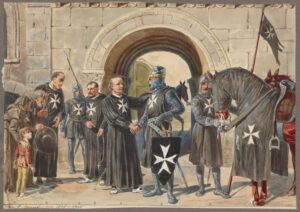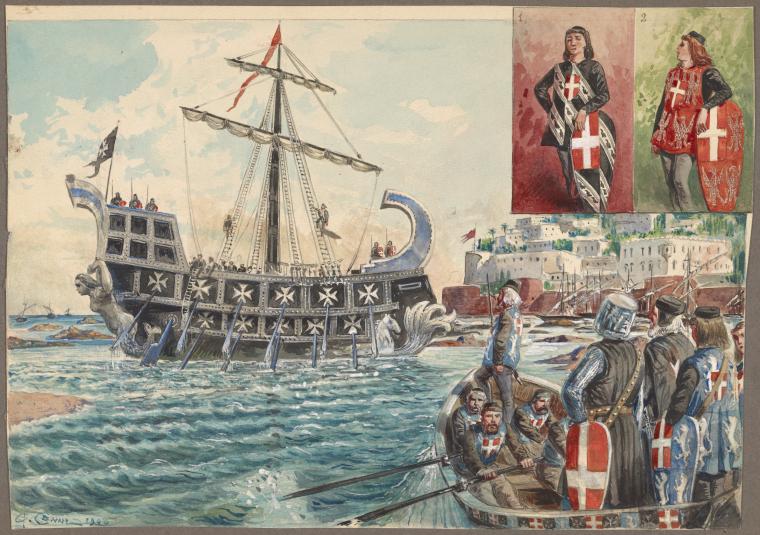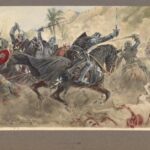I. Introduction
The Knights of Malta, or the Order of St. John, were not just a military and religious order, but also a sophisticated economic entity that shaped the Mediterranean’s commercial landscape. Their arrival in Malta in 1530 marked the beginning of a transformative era for the island’s economy and culture. This article delves deep into the economic foundations and strategies of the Knights, exploring how they leveraged Malta’s strategic position to become a formidable economic force.
II. Economic Foundations of the Knights of Malta
Global Network of Commanderies
The Knights’ economic power extended far beyond Malta. Their network of commanderies across Europe provided a steady stream of income through rents and donations. This global financial network allowed them to funnel resources to Malta, supporting their Mediterranean operations.
Maritime Economy and Strategic Location
Malta’s position at the crossroads of Mediterranean trade routes was pivotal to the Knights’ economic strategy. They transformed the island into a bustling entrepôt, facilitating trade between Europe, North Africa, and the Levant. The Grand Harbour, protected by Fort St. Angelo, became a symbol of their maritime prowess and economic vision.
Diversified Revenue Streams
The Knights diversified their income sources:
- Maritime trade and customs duties
- Agriculture and local industries
- Corso (privateering) against Ottoman shipping
- Banking and money-lending activities
- Hospitaller services and charitable donations

Consider our two favourite accommodations. Checkout the one in Sliema or the one in Gzira.
III. Economic Innovations and Policies
Maritime Insurance and Banking
The Knights pioneered early forms of maritime insurance, reducing risks for merchants using their ports. They also established rudimentary banking services, facilitating international trade transactions.
Regulatory Framework
A sophisticated system of laws and regulations governed economic activities in Malta. This included:
- Standardization of weights and measures
- Quality control for goods passing through the port
- Taxation policies that encouraged trade while filling the Order’s coffers
Public Works and Infrastructure
The Knights invested heavily in Malta’s infrastructure, recognizing its importance for economic growth:
- Expansion and fortification of harbors
- Construction of aqueducts and water management systems
- Development of Manoel Island for quarantine and commercial purposes
IV. The Knights’ Role in Regional Economics
Grain Trade Monopoly
The Knights established a near-monopoly on the grain trade between Sicily and North Africa. This not only ensured food security for Malta but also provided significant leverage in regional politics and economics.
| Malta Short Let: Cozy Stay in Gzira | |
|
Sliema Area Modern Designer Finished 2 Bedrooms + Games Room. First floor with Maltese Balcony Large back Terrace with swinging sofa Fully Airconditioned + Full Kitchen 3 TVs, including 65” with backlight. |

|
|
Book Now: Google Travel | Direct (Cheapest) | Booking.com | Airbnb |
|
Diplomatic-Economic Nexus
The Order’s diplomatic acumen was closely tied to its economic interests. They negotiated trade agreements, secured privileges, and maintained a delicate balance between competing powers to protect their economic interests.
Impact on Local Maltese Economy
The Knights’ rule brought significant changes to the local economy:
- Urbanization and development of the Three Cities
- Growth of skilled trades and crafts
- Increased monetization of the economy
V. Challenges and Adaptations
Piracy and Corso
While the Knights engaged in corso against Ottoman shipping, they also had to protect their own trade routes. This dual role required a sophisticated naval strategy and constant vigilance.
Competition with Emerging Atlantic Trade
As trade routes shifted to the Atlantic, the Knights had to adapt their economic strategies, focusing more on regional Mediterranean trade and enhancing Malta’s role as a service port.
Balancing Military and Economic Priorities
The constant threat of Ottoman invasion meant that the Knights had to balance economic development with military preparedness, as evidenced by the construction of St. Elmo Fortress.
VI. Legacy and Modern Relevance
Enduring Economic Structures
Many of the economic structures and practices introduced by the Knights laid the foundation for Malta’s modern economy, particularly in maritime services and international trade.
Cultural and Heritage Tourism
The Knights’ architectural and cultural legacy, including the mysteries and legends surrounding their rule, now forms a crucial part of Malta’s tourism industry, contributing significantly to the modern economy.
Continued Charitable Activities
The Order’s ongoing charitable work reflects the enduring impact of their economic model, which blended commercial acumen with social responsibility.
VII. Conclusion
The economic history of the Knights of Malta offers a fascinating case study in how a relatively small entity can leverage strategic location, diplomatic skill, and innovative policies to become a significant economic player. Their legacy continues to influence Malta’s economy and offers valuable lessons in economic adaptability and strategic management of resources.
To truly appreciate the enduring impact of the Knights of Malta, there’s no better way than to experience it firsthand. We invite you to embark on your own journey through Malta’s rich history and vibrant culture. As you explore the grand fortresses, wander through medieval streets, and soak in the Mediterranean atmosphere, you’ll feel the echoes of the Knights’ economic and cultural influence.
For an authentic and comfortable stay, we recommend choosing an Airbnb over traditional hotels. Airbnbs offer a more personal, home-like experience that allows you to immerse yourself in local life. Two excellent options to consider are:
- Sliema Airbnb: Located in the bustling town of Sliema, this property puts you at the heart of modern Malta while still being close to historical sites.
- Gzira Airbnb: Situated in Gzira, this Airbnb offers proximity to the marina and easy access to Valletta, allowing you to trace the maritime legacy of the Knights.
By choosing these Airbnbs, you’ll not only enjoy comfortable accommodations but also contribute to the local economy in a way that echoes the Knights’ approach to community-based economic development. Unlike impersonal hotel chains, these Airbnbs offer a chance to connect with local hosts and gain insider knowledge about Malta’s history and hidden gems.
So, as you plan your visit to explore the fascinating economic history of the Knights of Malta, consider making your stay as enriching as your explorations. Book an Airbnb, live like a local, and create your own unforgettable chapter in the ongoing story of Malta’s rich heritage.
VIII. Further Reading and Resources
- Mysteries and Legends of the Knights of Malta
- The Knights of Malta Today: Mission and Activities
- Manoel Island’s Lazzaretto: Malta’s Hidden History
- The Knights of Malta: Faith, Valor, and Survival
- A Guide to Becoming a Knight or Dame of Malta
- Joan Abela, “The Impact of the Arrival of the Knights of the Order of St. John on the Commercial Economy of Malta (1530-1565)”
- Joan Abela, “Hospitaller Malta and the Mediterranean Economy in the Sixteenth Century”
- Jonathan Riley-Smith, “The Knights Hospitaller in the Levant, c. 1070-1309”
- Victor Mallia-Milanes, “Malta and the Knights Hospitaller: 1530-1798”
- Nicholas J. Brown, “Sovereignty and International Law: The Knights of Malta”
- Derek J. Beeson, “The Knights of Malta: A Concise History”
- Henry J. Delaville Le Roulx, “The Order of Saint John of Jerusalem”
Consider our two favourite accommodations. Checkout the one in Sliema or the one in Gzira.








